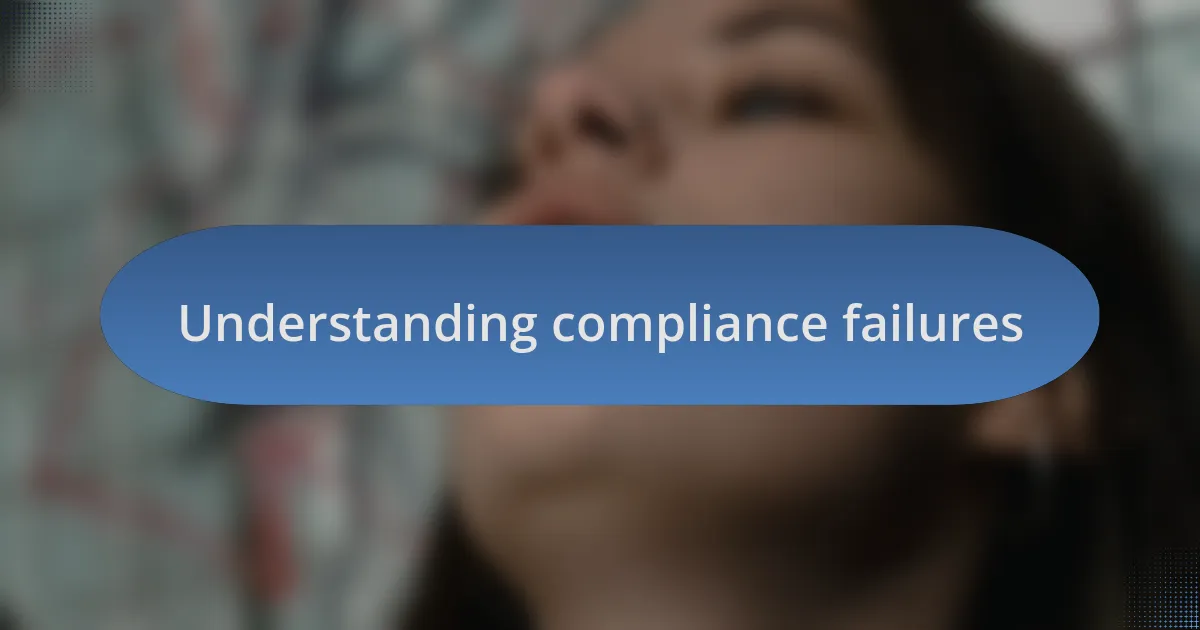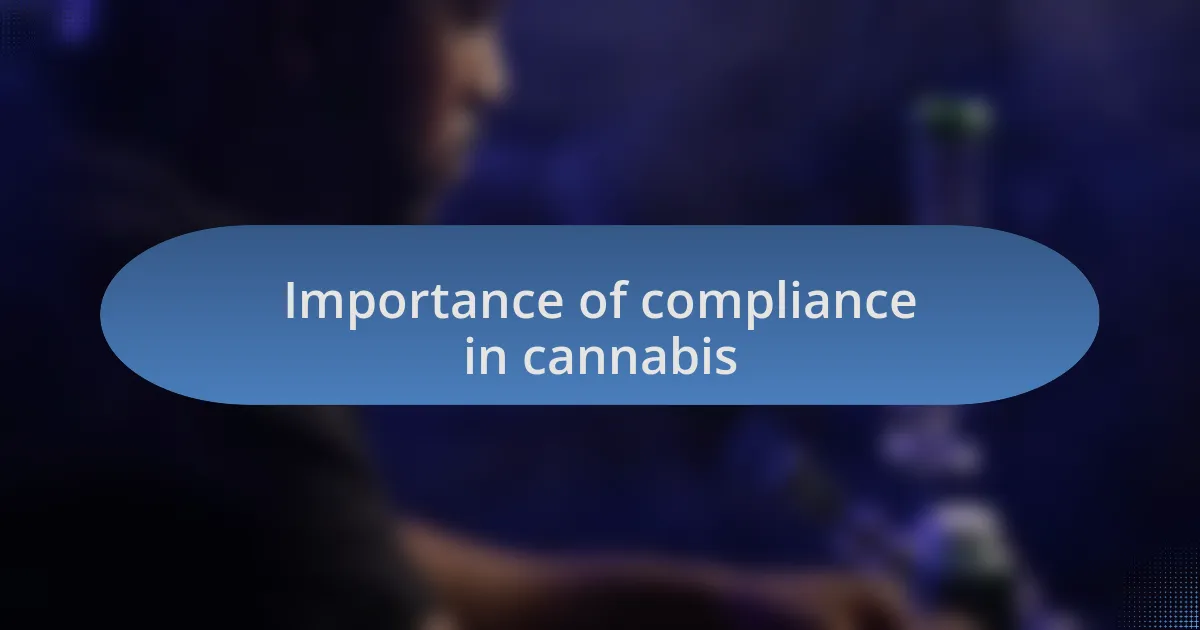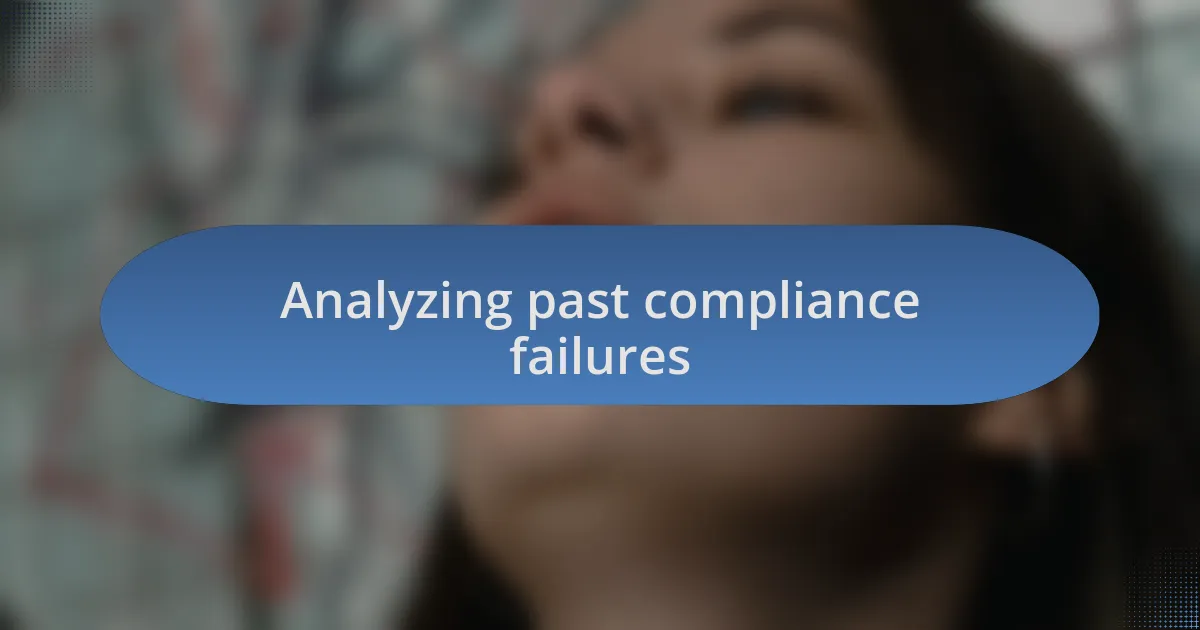Key takeaways:
- Compliance failures in the cannabis industry often stem from a lack of understanding of regulations, leading to costly mistakes.
- A strong compliance record fosters trust, protects against legal issues, and can drive operational improvements.
- Continuous education, meticulous documentation, and community engagement are essential for preventing compliance failures.
- Establishing training programs, creating compliance checklists, and promoting open communication enhance compliance efforts significantly.

Understanding compliance failures
Compliance failures can be a significant hurdle in the cannabis industry, often arising from a lack of understanding of regulations. I remember attending a seminar where a business owner shared how they accidentally overlooked a minor labeling requirement, resulting in a costly recall. It made me wonder: how many businesses are unknowingly on the verge of a similar mistake?
Navigating the intricate web of compliance can feel overwhelming. Just last year, I saw a startup face severe penalties because they misunderstood age verification laws. It struck me that even the smallest oversight can lead to devastating consequences, raising the question: are we prioritizing compliance enough in our daily operations?
The emotional impact of compliance failures can be equally alarming. I once spoke with a cultivator who expressed a deep sense of frustration over the constant changes in regulations. This sentiment resonated with me; it’s daunting to think that our hard work can hinge on our ability to keep up with ever-evolving laws. Isn’t it essential to foster a culture of compliance where questions are encouraged and clarity is prioritized?

Importance of compliance in cannabis
Compliance in the cannabis industry isn’t just a legal obligation; it’s a foundation for trust and safety. I recall a time when a dispensary I visited proudly displayed their compliance certifications. The owner spoke passionately about how this transparency not only reassured customers but also fostered loyalty in a competitive market. Don’t you think a strong compliance record can be a powerful differentiator for businesses?
Another critical aspect is the protection compliance offers against potential legal repercussions. I remember reading about a manufacturer that faced major lawsuits because they mismanaged testing protocols. This unfortunate incident made me realize that compliance isn’t just about avoiding fines; it’s about safeguarding your business and ensuring the products reach consumers in the safest manner possible. Isn’t it worth investing time and resources into a solid compliance strategy?
Moreover, compliance can drive innovation and efficiency in operations. During one of my visits to a manufacturing facility, I saw how adhering to strict standards pushed them to upgrade their processes and technologies. This not only enhanced quality but also improved productivity. Have you considered how a commitment to compliance can lead to unexpected benefits, from operational improvements to boosted employee morale?

Analyzing past compliance failures
Analyzing compliance failures in the cannabis industry reveals a pattern that can be both enlightening and cautionary. I recall a case where a well-known brand faced severe backlash after failing to label their products correctly, leading consumers to unknowingly ingest higher THC levels. It struck me how quickly trust can evaporate, reminding us that transparency is paramount. Have you ever considered how a single oversight could tarnish a brand’s reputation?
In another instance, I stumbled upon a report about a cultivation facility that neglected to maintain proper environmental controls, resulting in a catastrophic pest infestation. This incident underscored to me that compliance is not just about the paperwork; it directly impacts product quality and consumer health. Isn’t it unsettling to think that a lack of diligence could put countless individuals at risk?
These failures serve as crucial lessons, highlighting the need for rigorous training and awareness within organizations. I’ve spoken to compliance officers who emphasize that fostering a culture of accountability is vital. They believe that every team member should see compliance not just as a requirement, but as their personal responsibility. Isn’t it fascinating how a proactive approach can prevent not just failures, but also enhance overall industry integrity?

Lessons learned from compliance experiences
When reflecting on compliance experiences, one lesson stands out: the importance of continuous education. I once attended a seminar led by a compliance officer who shared a story about a third-party vendor who misunderstood labeling requirements, resulting in a costly recall. This error could have been avoided with better training and communication. Don’t you think investing in education could save businesses from such expensive mistakes?
Another key takeaway is the necessity of meticulous documentation. I remember working with a cannabis company that faced scrutiny due to incomplete records during an audit. The stress and chaos that ensued was overwhelming, showing me that robust documentation practices are not just busywork; they are essential for demonstrating compliance. Have you ever realized how much smoother operations could be with thorough records in place?
Lastly, engaging with the community can foster a greater understanding of compliance challenges. I found that attending local cannabis forums opened my eyes to concerns from consumers and retailers alike. These interactions reinforced my belief that communication is key, allowing businesses to address compliance issues proactively. Isn’t it interesting how a dialogue can bridge gaps and enhance compliance efforts?

Practical steps to improve compliance
Improving compliance in the cannabis industry starts with establishing a comprehensive training program for all employees. I once worked with a team that initially struggled with understanding compliance protocols; after implementing weekly training sessions, the change was astounding. Have you ever noticed how knowledge equips a team to make better decisions, thus minimizing risks?
Another effective step involves creating a compliance checklist that outlines essential regulations and best practices. During my time at a cannabis dispensary, we introduced a simple checklist that employees could reference daily. This small adjustment not only streamlined our processes but also empowered staff to take ownership of their roles. Isn’t it fascinating how a little guidance can inspire confidence in handling compliance matters?
Finally, fostering a culture of transparency and open communication can transform compliance efforts. In a previous role, I encouraged staff to voice concerns without fear of repercussions, which led to valuable insights about potential compliance pitfalls. Have you found that when people feel safe to speak up, it opens the door to improvements that might otherwise go unnoticed?

Personal reflections on compliance journey
Navigating the compliance landscape in the cannabis industry has been a journey filled with unexpected lessons. I recall a time when I overlooked a minor regulatory detail, thinking it was insignificant. That oversight not only led to a hefty fine but also served as a wake-up call, reinforcing the importance of attention to every aspect of compliance. Have you ever underestimated a small detail only to realize its significant impact later?
I’ve also learned that compliance is not just about following rules; it’s about cultivating a mindset that values ethical practices. I remember a team brainstorming session where we discussed not only what to do to stay compliant but why those regulations matter. Seeing my colleagues connect the dots emotionally fostered a deeper commitment to compliance within our team. Doesn’t it make you wonder how understanding the ‘why’ can shift our perspective on compliance from a chore to a core value?
In reflecting on this journey, I’ve come to appreciate the role of resilience in facing compliance challenges. When setbacks occurred, instead of feeling defeated, I focused on the lessons learned. I once faced a significant audit that tested our processes thoroughly; rather than seeing it as a punitive measure, I viewed it as an opportunity to enhance our systems. Isn’t it interesting how our mindset can turn potential roadblocks into stepping stones for improvement?